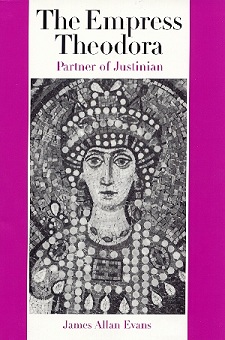
The Empress Theodora
James Allan Evans
146 pages including index
published in 2002
Ken MacLeod once said that “history is the trade secret of science fiction”, but sometimes it’s abused and nowhere more so than in the cribbing from early Byzantine history that has been ongoing ever since Isaac Asimov first put in thinly disguised expys of emperor Justinian and general Belisarius in his Foundationtrilogy. Largely overlooked in these sort of appropriations is the empress Theodora, who as James Allan Evans shows in The Empress Theodora – Partner of Justinian was just as important as her husband in determining the course of the Byzantine empire.
There were quite a few strong woman emperors in Byzantine history, but most of them either ruled through their weak husbands, or as regents ruling in place of their still minor children. Theodora on the other hand ruled together with Justinian, a strong emperor himself. Their rule was a true partnership and it’s this relationship and Theodora’s role in it that Evans wants to examine here. At the same time The Empress Theodora is also a concise biography/history accessible to lay people like me.
The main problem with writing a biography of somebody who died in 548 CE is of course finding reliable sources. Archaeology won’t really help you much in pinning down the details of any given individual ruler’s life, though it can help with establishing the broad outlines of their reigns (e.g. through coins minted during their rule, or statues dedicated to their thriumps). Therefore the biographer needs to depend on the fortitious survival of primary sources dealing with their chosen subject. For Theodora luckily there are several such sources; contemporary histories, religious treatments and so on, but there’s one source that throws its shadow over the rest: the Secret History of Procopius.
Procopius was an official on the general staff (so to speak) of Belisarius and a gifted writer and historian. As such he wrote a history of Justinian’s wars, The History of the Wars in which he of course biggened up both the emperor and Belisarius, which is the most important reason why the latter is still so well known. As what you might call a court historian he was of course full of praise for the emperor and Theodora both, but in private his opinions were much less flattering. The Secret History is where all this saved up bile spewed out and Theodora does not come out looking well.
According to Procopius Theodora was born and raised in the theatre, a whore who used her sexual favours to become empress and kept using it to keep Justinian in her thrall and through him ruin the empire. Nonsense obviously, the rantings of a jealous man with the usual accusations against any woman who gains any sort of power in a patriarchal society like the Byzantine Empire, but not without a grain of truth, as Evans argues. That Theodora was of a humble background, even a theatrical background has been claimed in other sources as well, sources not as obviously hostile to her. Procopius therefore is likely to have been largely right about her background, just very slanted in how he presented it and biased in his interpretations, which has coloured later views of her.
James Allan Evans tries to look past the bias of Procopius and other sources to the real Theodora and the pictures he sketches of her is appealing. He argues that she was a true partner to Justinian as empress, also functioning as a sort of “loyal opposition” to him, the one person who could stand against him when necessary without fear of her life. This was especially important in the religious conflicts that dominated Justinian’s reign.
It’s hard to judge the importance of Christian dogma in the politics and daily life of the Byzantine Empire, but it’s fair to say these were more than academic debates. Once the Roman Empire had become an explicitely Christian one it was always going to become monoreligous, with only one kind of Christianity allowed. Which kind was decided by the ruling emperor and Justinian followed his immediate predecessor by supporting the Chalcedonian doctrine, against the Monophysites, who were now heretic. Theodora on the other hand was herself inclined towards Monophysitism and supported and protected them, to the point where she was later made a saint. Evans argues that she also functioned as a lightening rod, drawing dissenters towards her, with the end result being that Monophysite dissent could largely be channeled, rather than run wild. Theodora played the same roles in more down to earth political matters as well, as Evans e.g. shows how she influenced Justinian into putting more effort in his Italian campaigns to retake the old Western Empire.
At just under 120 pages, The Empress Theodora is more of a sketch than a full biography of course, but it’s a great way to start. Evans is a clear and careful writer, taking care to note the limits of his sources. Glad I took this out of the library.
chris y
June 26, 2012 at 8:43 amI suspect that her Monophysitism was a more important source of Procopius’ hostility even than her gender and background. They really cared about this shit.
Martin Wisse
July 2, 2012 at 12:08 pmYeah, that comes through a lot in this book.